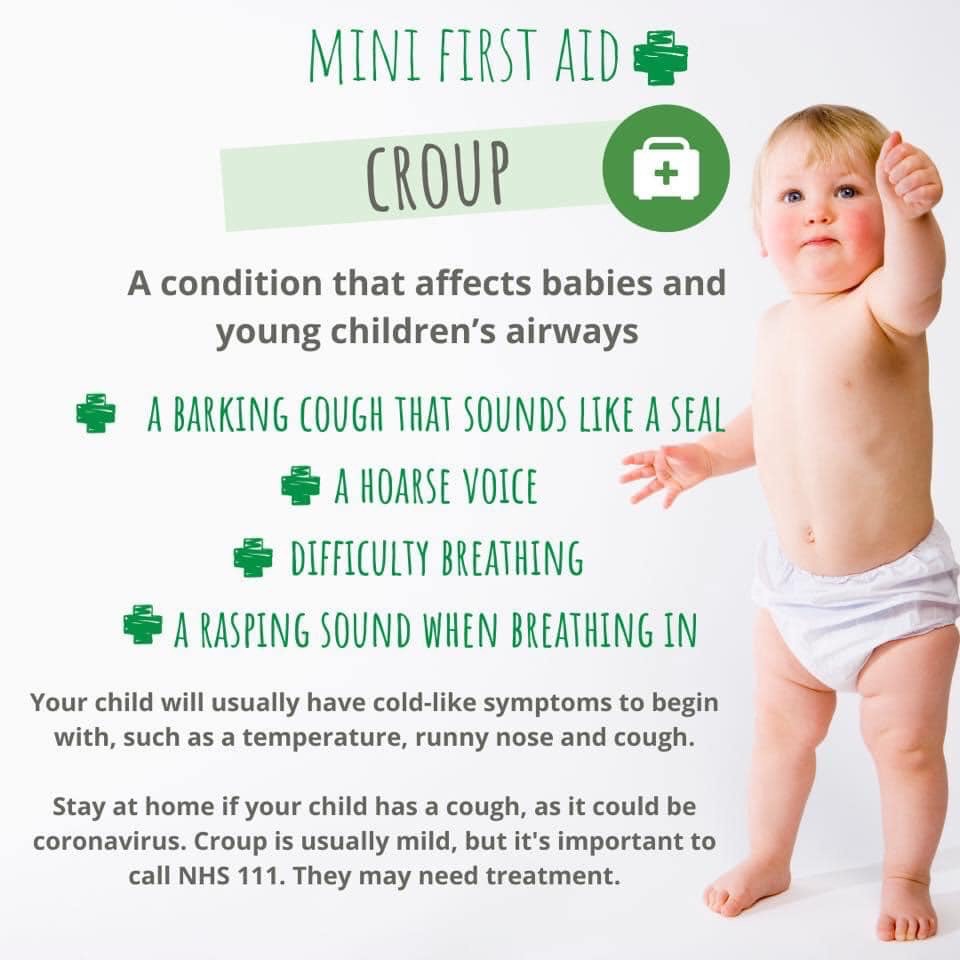Croup is a common condition at this time of year, and with its distinctive cough, can be very frightening for parents. In fact, one of our Mini First Aid trainers who is also a paramedic had her own frightening experience - Tina, soon to launch Mini First Aid Portsmouth says:
“We adopted our son when he was three years old. He had only been living with us for two months, when he developed croup. Regardless of being a professional, I panicked and called my friend. She told me to calm down and go into work mode and I did exactly that and was able to assist my son to the best of my abilities.”
Tina knew that staying calm was key to helping a child suffering from croup, and in this weeks blog, we hope to give you the knowledge to take the fear factor out of this common childhood illness.
So what is croup and who does it affect?
Croup is a common childhood condition, usually caused by a virus which affects the windpipe, lungs and voice box. It usually affects young children aged between 6 months and 3 years. However, it can develop in babies as young as 3 months, and in older children. Interestingly, croup affects more boys than it does girls.
What are the main symptoms of croup?
· Cold-like symptoms such as a temperature and runny nose
· A harsh, barking cough that sounds like a seal (you can search online to hear examples)
· A hoarse voice
· Difficulty breathing
· A rasping sound when breathing in (known as stridor)
Treatment for croup
Most cases of croup are mild and can be treated at home. However, even a mild case of croup is distressing for both parent and child because it makes it difficult to breathe. Combined with the noisy cough, this can cause panic, especially as the symptoms are often worst at night. To help your child:
· Sit them upright and comfort them. Crying can make the symptoms worse so stay as calm as you can and provide reassurance
· Encourage your child to drink plenty of fluids to prevent dehydration
· Call NHS 111 if you think your child might have croup – it is usually a mild illness but sometimes might need treatment
· It is not advised to give cough or cold medicines, or to use steam to treat croup.
Croup should clear up within 48 hours, however, it can last for up to 2 weeks.

How do I know if it is more serious?
In rare cases, children may need to be hospitalised with croup. Call 999 or take your child to A&E if:
· They are struggling to breathe – you may see their tummy sucking inwards or a change in breathing sound
· Their skin or lips look very pale or blue
· They’re unusually quiet / still
· They get a sudden very high temperature
Preventing croup
Croup is spread in the same way as the common cold, so can be difficult to prevent against, especially in toddlers! Good hygiene is the main defence, so lots of hand washing and cleaning of surfaces are the best prevention.
Please remember that for the vast majority of children, croup, whilst sounding very frightening, is a mild childhood condition. We hope that now you’ve read this, you can stay calm and provide reassurance should you hear that seal-like cough in the middle of the night.
The Mini First Aid Team x
Credits: NHS UK, NHS Inform







